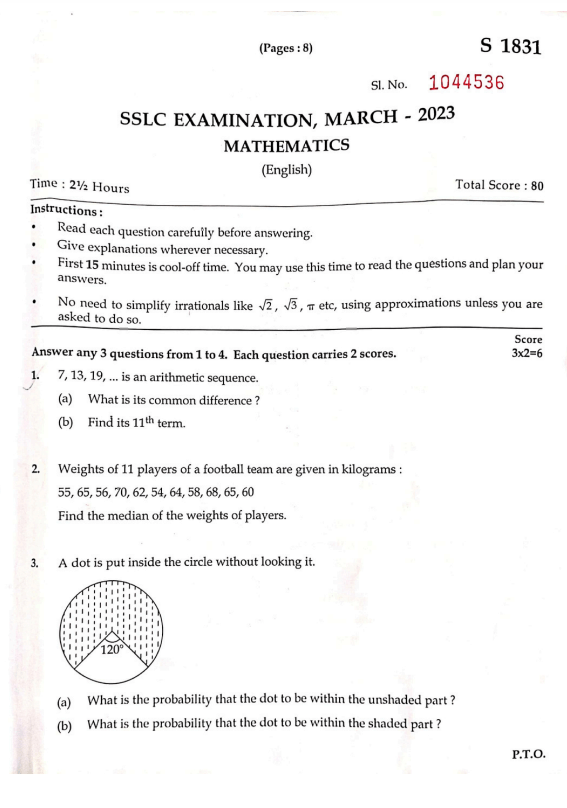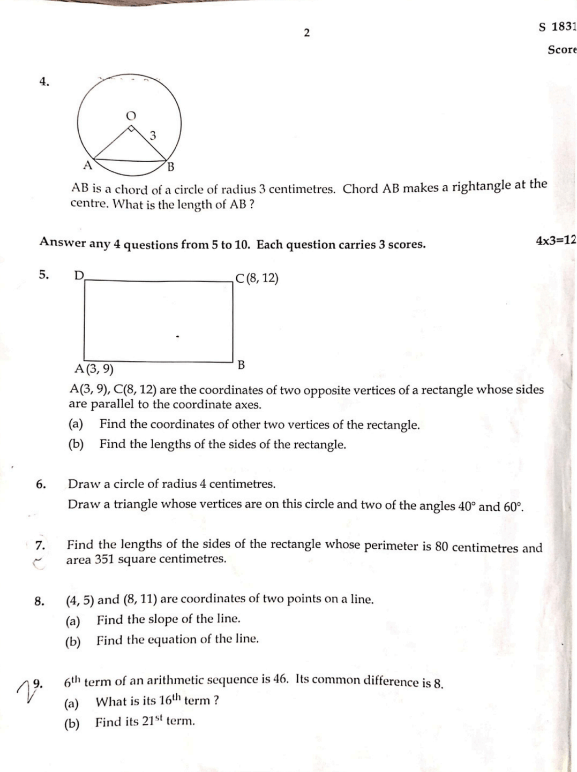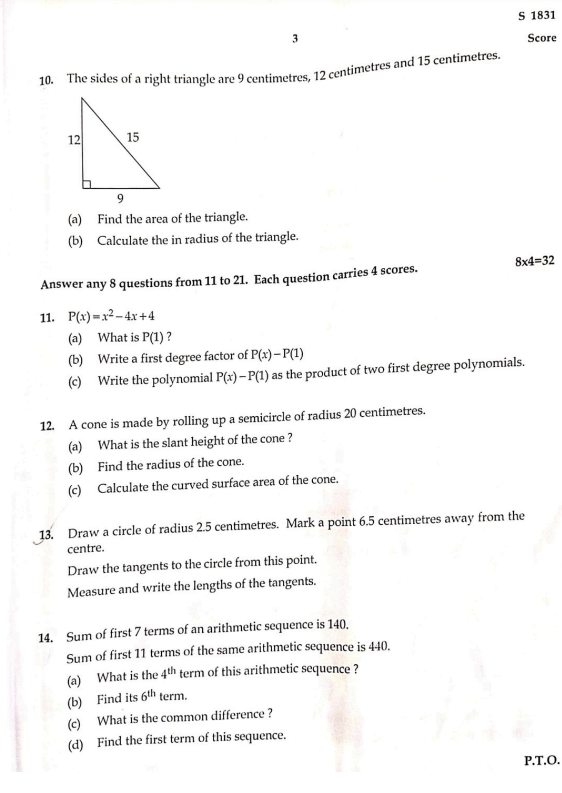Samagra Shiksha Kerala Question Paper 2018 10th : With the help of our website, which has an extensive collection of Previous Paper of Samagra Shiksha Kerala 10th, you may successfully prepare for your Samagra Shiksha Kerala 10th Board Exam. Get access to a large selection of past exam questions that have been carefully chosen to cover subjects related to the Samagra Shiksha Kerala 10th Board course . Download practice tests in several formats, such as multiple-choice questions (MCQs) and descriptive questions, to help you prepare for exams and increase your confidence. With the help of our platform, you can revise with concentrate and recognize important themes and question formulation trends. Get ongoing help and direction to help you prepare for and pass the Samagra Shiksha Kerala 10th Exam.
- Introduction : Samagra Shiksha Kerala Question Paper 2018 10th
- Download : Samagra Shiksha Kerala Question Paper 2018 10th with Solution
- Syllabus : Samagra Shiksha Kerala Question Paper 2018 10th
- Exam Pattern : Samagra Shiksha Kerala Question Paper 2018 10th
- Significance of Samagra Shiksha Kerala Question Paper 2018 10th
- Tips for Good Preparation : Samagra Shiksha Kerala Question Paper 2018 10th
- FAQs : Samagra Shiksha Kerala Question Paper 2018 10th
Introduction : Samagra Shiksha Kerala Question Paper 2018 10th
The Kerala SSLC (Secondary School Leaving Certificate) exam is a significant milestone for students in the Indian state of Kerala. Here’s a brief overview:
Purpose:
The purpose of the SSLC exam is to evaluate students’ knowledge and comprehension at the conclusion of their tenth grade study. For pupils wishing to continue their education in higher secondary classes or vocational training, it is an essential qualification.
Curriculum:
The curriculum for the SSLC exam typically includes subjects such as:
- Languages: Malayalam (or other regional languages), English, and sometimes Hindi or Sanskrit.
- Mathematics
- Science: Physics, Chemistry, and Biology.
- Social Science: History, Geography, Political Science, and Economics.
- Optional Subjects: Depending on the school, this may include subjects like Information Technology or another elective.
Exam Structure:
- Format: The exams are usually written, consisting of objective-type, short-answer, and long-answer questions.
- Duration: Each subject paper typically lasts about 2.5 to 3 hours.
- Grading: Students are graded on a scale, and the marks obtained are crucial for determining their eligibility for higher secondary education streams.
Schedule:
Written exams for the SSLC are typically administered in March or April of each year. The Kerala Board of Public Examinations releases the precise timetable.
Preparation:
- Syllabus: Students should refer to the official syllabus provided by the Kerala State Education Board.
- Previous Papers: Practicing past exam papers and sample questions can be helpful.
- Revision: Regular revision and understanding key concepts are crucial.
Results:
- Declaration: Results are typically announced a few months after the exams, around May-June.
- Certification: Successful students receive the SSLC certificate, which is required for admission to higher secondary schools or other post-10th educational courses.
Board:
The SSLC exams are administered by the Kerala Board of Public Examinations (KBPE), which is also in charge of releasing the results.
For students in Kerala, passing this exam is an essential part of their academic experience because it sets the stage for future academic and professional options.
Download : Samagra Shiksha Kerala Question Paper 2018 10th with Solution
| Samagra Shiksha Kerala Question Paper 2018 10th | Question Papers |
|---|---|
| Samagra Shiksha Kerala Question Paper 2018 10th Hindi | Download Here |
| Samagra Shiksha Kerala Question Paper 2018 10th English | Download Here |
| Samagra Shiksha Kerala Question Paper 2018 10th Mathematics | Download Here |
| Samagra Shiksha Kerala Question Paper 2018 10th Physics | Download Here |
| Samagra Shiksha Kerala Question Paper 2018 10th Chemistry | Download Here |
| Samagra Shiksha Kerala Question Paper 2018 10th Biology | Download Here |
| Samagra Shiksha Kerala Question Paper 2018 10th Malayalam | Download Here |



Syllabus : Samagra Shiksha Kerala Question Paper 2018 10th
Kerala SSLC Syllabus 2025 : Mathematics Syllabus
| Topic | Subtopics |
|---|---|
| Arithmetic Sequences | Definitions and Properties nth Term of an Arithmetic Sequence Sum of the First n Terms |
| Mathematics of Chance | Probability Basics Simple Events and Compound Events Applications of Probability |
| Circles | Properties of Circles Chords, Tangents, and Arcs Angle Properties and Theorems |
| Second Degree Equations | Quadratic Equations Solution Methods (Factorization, Completing the Square, and Quadratic Formula) Applications and Word Problems |
| Geometry and Algebra | Coordinate Geometry Basics Algebraic Expressions and Identities Graphical Solutions to Equations |
| Trigonometry | Trigonometric Ratios and Identities Applications of Trigonometry Heights and Distances |
| Coordinates | Cartesian Coordinate System Distance Formula Section Formula |
| Polynomials | Definitions and Properties Polynomial Identities Graphs of Polynomials |
| Tangents | Properties of Tangents Tangents to Circles and Parabolas |
| Solids | Surface Area and Volume of Solids (Cubes, Cuboids, Cylinders, Cones, and Spheres) Surface Area and Volume Formulas |
| Statistics | Mean, Median, and Mode Data Representation (Bar Graphs, Histograms, Pie Charts) Probability Distributions |
Kerala SSLC Syllabus 2025 : English Syllabus
| Topic | Subtopics |
|---|---|
| Reading Comprehension | Understanding and Analyzing Passages Answering Questions Based on Texts |
| Writing | Essay Writing Letter Writing (Formal and Informal) Report Writing |
| Pronoun | Types of Pronouns Pronoun-Antecedent Agreement |
| Adjective | Types and Uses of Adjectives Comparative and Superlative Forms |
| Verb | Verb Tenses Subject-Verb Agreement |
| Punctuation | Use of Commas, Periods, Semicolons, Colons, etc. Correcting Punctuation Errors |
| Conjunction | Types of Conjunctions Use in Complex Sentences |
| Sentences | Types of Sentences (Declarative, Interrogative, Imperative, Exclamatory) Sentence Structure and Formation |
| Tenses | Present, Past, and Future Tenses Perfect and Progressive Tenses |
| Transformation of Sentences | Active and Passive Voice Direct and Indirect Speech |
| Vocabulary | Synonyms and Antonyms Word Formation and Usage |
Kerala SSLC Syllabus 2025 : Science Syllabus
Physics
| Topic | Subtopics |
|---|---|
| Effects of Electric Current | Ohm’s Law Series and Parallel Circuits Applications of Electric Current |
| Power Transmission and Distribution | Generation of Electricity Transmission Lines Distribution Systems |
| Electromagnetic Induction | Faraday’s Laws Lenz’s Law Applications of Electromagnetic Induction |
| Wave Motion | Types of Waves Wave Properties Sound Waves |
| Heat | Heat Transfer Thermodynamics Applications of Heat |
| Electronics and Modern Technology | Semiconductors Transistors and Diodes Digital Electronics |
| Colors of Light | Spectrum of Light Primary and Secondary Colors Applications of Light Colors |
| Energy Management | Energy Resources Conservation of Energy Sustainable Energy Solutions |
Kerala SSLC Syllabus 2025 : Chemistry
| Topic | Subtopics |
|---|---|
| Nomenclature of Organic Compounds | IUPAC Naming Functional Groups |
| Mole Concept | Avogadro’s Number Molar Mass Applications of Mole Concept |
| Reactivity Series and Electrochemistry | Reactivity Series Electrochemical Cells Redox Reactions |
| Rate of Chemical Reactions and Chemical Equilibrium | Factors Affecting Reaction Rates Le Chatelier’s Principle Applications of Chemical Equilibrium |
| Production of Metals | Extraction Methods Refining Processes |
| Chemical Reactions of Organic Compounds | Addition and Substitution Reactions Oxidation and Reduction Reactions |
| Periodic Table and Electronic Configuration | Periodic Trends Electronic Configuration of Elements |
| Chemistry for Human Progress | Applications in Medicine Environmental Chemistry |
Kerala SSLC Syllabus 2025 : Biology
| Topic | Subtopics |
|---|---|
| Genetics for Future | Genetic Disorders Genetic Engineering |
| Sensations and Responses | Sensory Systems Neural Responses |
| Unraveling Genetic Mysteries | DNA Structure and Function Genetic Mutations |
| Keeping Diseases Away | Immunity Preventive Measures |
| Windows of Knowledge | Biotechnological Advances Biological Research Methods |
| Chemical Messages for Homeostasis | Hormonal Regulation Feedback Mechanisms |
| The Paths Traversed by Life, Soldiers of Defense | Immune System Components Defense Mechanisms in Organisms |
Kerala SSLC Syllabus 2025 : Social Science Syllabus
Geography
| Topic | Subtopics |
|---|---|
| India: The Land of Diversities | Geographical Features Climate and Vegetation |
| Seasons and Time | Seasonal Changes Time Zones |
| Human Resources Development in India | Population Growth Employment and Education |
| Eyes in the Sky and Data Analysis | Remote Sensing Data Interpretation |
| Terrain Analysis through Maps | Topographic Maps Cartographic Techniques |
| In Search of the Source of Wind | Wind Patterns Factors Affecting Winds |
| Resources Wealth of India | Natural Resources Resource Management |
Kerala SSLC Syllabus 2025 : Civics
| Topic | Subtopics |
|---|---|
| Public Administration | Administrative Structure Role of Bureaucracy |
| Civic Consciousness | Rights and Duties of Citizens Civic Responsibilities |
| The State and Political Science | State Functions Political Systems |
Kerala SSLC Syllabus 2025 : History
| Topic | Subtopics |
|---|---|
| Revolutions that Influenced the World | American Revolution French Revolution |
| India After Independence | Post-Independence Developments Economic and Social Changes |
| World in the Twentieth Century | Major World Events Global Conflicts and Treaties |
| British Exploitation and Resistance | Colonial Exploitation Resistance Movements |
| Struggle and Freedom | Freedom Struggles Independence Movements |
| Culture and Nationalism | Cultural Revival Nationalistic Movements |
| Kerala Towards Modernity | Modernization in Kerala Social and Economic Changes |
Kerala SSLC Syllabus 2025 : Economics
| Topic | Subtopics |
|---|---|
| Public Expenditure and Public Revenue | Types of Public Expenditure Sources of Public Revenue |
| Consumer: Satisfaction and Protection | Consumer Rights Consumer Protection Laws |
| Financial Institutions and Services | Types of Financial Institutions Banking Services Non-Banking Financial Services |
Exam Pattern : Samagra Shiksha Kerala Question Paper 2018 10th
Kerala SSLC exam pattern 2025
Students must be aware of the Kerala class 10 exam pattern after learning the Kerala SSLC syllabus. Students will learn about the test pattern, including the marking system, length of the exam, total amount of questions, and sorts of questions asked. The pupils’ performance in the Kerala SSLC exam would improve as a result.
| Subject | Total Marks | Duration |
|---|---|---|
| First Language Paper 1 | 50 | 1.5 hours |
| First Language Paper 2 | 50 | 1.5 hours |
| Second Language English | 100 | 2.5 hours |
| Third Language Hindi/General Knowledge | 50 | 1.5 hours |
| Physics | 50 | 1.5 hours |
| Chemistry | 50 | 1.5 hours |
| Biology | 50 | 1.5 hours |
| Social Science | 100 | 2.5 hours |
| Mathematics | 100 | 2.5 hours |
Significance of Samagra Shiksha Kerala Question Paper 2018 10th
The significance of Samagra Shiksha Kerala Question Paper 2018 10th lies in their ability to serve as valuable study resources for candidates preparing for the Samagra Shiksha Kerala 10th Board examination. Here are some key reasons why these question papers are important:
Exam Blueprint Revealed:
The actual exam is modeled by these papers. You can learn a lot about the arrangement of the questions, the relative importance of the various areas on the syllabus, and even the degree of difficulty by carefully examining them. This enables you to customize your study and give priority to the subjects that need greater attention.
Improving Your Skills:
Using past year papers for practice is similar to taking practice exams in a real exam setting. You get to put your speed, accuracy, and conceptual understanding to the test in a virtual setting. This assists in determining your areas of strength and weakness prior to the exam, enabling you to improve your strategy and reinforce your comprehension of important subjects.
Building Exam Stamina:
The Samagra Shiksha Kerala 10th Board exam may have a time limit, therefore success depends on your ability to manage your time well. You can improve your endurance and time management abilities for the test by using previous year’s papers. You can learn to pace yourself, prioritize questions, and stay away from becoming bogged down on any one problem by practicing in a timed environment.
Increasing Confidence:
Completing last year’s papers successfully boosts your self-assurance and eases exam anxiety. Observing that you can appropriately respond to questions validates your understanding and inspires you to keep trying. Your overall exam performance is significantly impacted by this positive reinforcement.
Finding Recurring Patterns:
Although the precise questions won’t be asked again, reviewing previous exams frequently identifies patterns in the subjects and question types that are asked again. This enables you to create focused strategies for answering the kinds of questions you might encounter on the actual exam by anticipating their types.
It’s like having a secret weapon when you use the Samagra Shiksha Kerala Question Paper 2018 10th in your preparing approach. They sharpen your abilities, give you confidence boosts, and offer priceless insights, all of which considerably raise your chances of succeeding on test day.
Tips for Good Preparation : Samagra Shiksha Kerala Question Paper 2018 10th
Recognize the test and syllabus:
Visit the Kerala Board website to download the official announcement and curriculum.
Recognize the format of the exam (number of sections, weighted scores, time allotment).
Learn everything there is to know about the subjects included on the curriculum for each area.
Create a Timetable and Study Plan:
Make a realistic study schedule with time allotted for each section based on the syllabus and your preferred method of learning.
Establish study times on a daily or weekly basis, and try your best to maintain them.
Be adaptable and make necessary changes to your plan, but consistency is essential.
Establish a Robust Base:
Pay close attention to the fundamental ideas in each area, paying particular attention.
Learn the fundamental, shortcuts, and approaches to solving problems.
Make Use of Educational Resources
Make use of top-notch study resources, such as online courses, textbooks, and coaching materials (if necessary).
Exam patterns and time management exercises can be learned by looking at previous year’s question papers and practice exams.
Consistent Practice:
Every day, complete practice questions from different sources.
Prioritize precision while progressively picking up speed.
Examine your errors and determine what needs to be improved.
By following these tips and dedicating yourself to consistent preparation, you can significantly increase your chances of success in the Samagra Shiksha Kerala Question Paper 2018 10th. Remember, the key is to start early, work hard, and stay focused on your goal.
FAQs : Samagra Shiksha Kerala Question Paper 2018 10th
Q1: What is the Kerala Board 10th exam?
A1: The Kerala Board 10th exam, also known as the Kerala SSLC exam, is a public examination conducted by the Kerala Pareeksha Bhavan for students in Class 10. It is a crucial examination for students as it marks the completion of their secondary education and is a prerequisite for further studies.
Q2: When is the Kerala SSLC exam usually held?
A2: The Kerala SSLC exams are typically held in March every year. The exact dates are announced by the Kerala Pareeksha Bhavan, and they can vary slightly from year to year.
Q3: What is the eligibility criteria for the Kerala SSLC exam?
A3: Students must be enrolled in a recognized school and should have completed the prescribed curriculum for Class 10. Attendance and academic requirements set by the Kerala Pareeksha Bhavan must also be met.
Q4: How can students apply for the Kerala SSLC exam?
A4: Students must fill out the application form provided by their respective schools. The school is responsible for submitting the forms and fees to the Kerala Pareeksha Bhavan. Students should ensure that all information is accurate and submitted before the deadline.
Q5: What subjects are included in the Kerala SSLC exam?
A5: The Kerala SSLC exam covers a range of subjects including:
- First Language (e.g., Malayalam, English, Hindi)
- Second Language (e.g., English, Hindi, Malayalam)
- Mathematics
- Science
- Social Science
- Optional subjects (if applicable)
Q6: When are the results announced?
A5: The results are usually announced in May or June, a few weeks after the exams are completed. The exact date is announced by the Kerala Pareeksha Bhavan.






